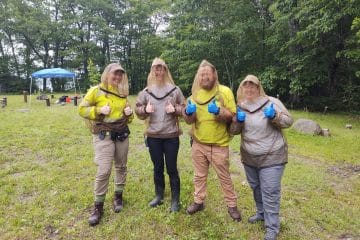
No Final Whistle: How Lessons in Teamwork Translate into Environmental Field Work
Author: Stephanie Stone, Staff Scientist
“Herons on three!”, I shouted, almost definitively. It was the last time I would ever say those words, on that field, with the people that I’ve grown the closest to. The end to my field hockey career stung like a heartbreak. Hanging up my jersey marked the end of a chapter I never was quite fully prepared to finish. When you play a sport in college, it becomes your identity, one of your descriptors. Everyone knew me as the field hockey goalie. For over a decade, it consumed my life, and once the final whistle blew, I felt like I was losing a piece of myself.
Sports to Career
Collegiate athletics instilled in me a work ethic that I transitioned into my professional life. They taught me a lot about myself and how to collaborate with those with differing personalities than mine. I created friendships that will last a lifetime. We worked well together on the field, but that did not happen overnight. It took time for us to trust in each other’s abilities, to understand people’s strengths, and to lift them up in times of weakness. The team became a close-knit group that was hard to say goodbye to. I cherish the memories we made and when I look back on my experience, it’s not the wins and losses I remember most, it’s how being a part of that team shaped me into the person I am today.
Challenges in Environmental Field Work
Transitioning into environmental consulting and field work brought its own set of challenges. I promptly learned that field work is demanding – physically, mentally, and technically challenging too. It is a dynamic, fast paced environment where you must anticipate and solve problems on the fly. Much like in sports, success is based on effective teamwork. For these reasons and many others, the work is undoubtedly fulfilling. Environmental field work is by no means a one-person job, even on a seemingly small sampling event. As field staff, we are responsible for interpreting and communicating ever-changing site conditions to our project team members and other stakeholders effectively and frequently.
There is rarely a perfect site, but there are some that are far less than perfect. Your monitoring wells don’t recharge. There are unexpected snow squalls. The equipment you rented loses functionality. Or, most unfortunately, a combination of the three. During these hardships, it is teamwork that will make for a successful field assignment. As field staff, we should be able to lift each other up when challenging situations arise and work together to navigate issues that occur on our job sites. I vividly recall one particularly difficult site last fall in a remote location. Cell service was minimal and the time of year was unforgiving in terms of daylight. Hazardous materials added an extra layer of complexity, requiring constant attention to safety. Yet, through teamwork and resourcefulness, my team managed to surpass every obstacle.
Carrying Sports Values Forward
When I picked up my first field hockey stick, it did not occur to me that the decision would come to shape the rest of my life. We don’t join sports expecting it to land us a job in STEM, but they do instill values that translate in the workforce when it comes time to enter it. Sports change who we are as a person. They teach discipline and cultivate a passion, both favorable qualities to carry into field work. Most importantly, they teach us how to work with others and become valuable members of a team. Fostering a sports team culture in the field can introduce a supportive environment to get a difficult job done. My time as a technical staff member thus far has shown me that, while I hung up my field hockey jersey in 2022, I picked up a new one when I became an environmental staff scientist. I’ve been accepted into a new team, and while I’ve traded in my goalie helmet for a hard hat, I strive to foster the same values that have gotten me this far, just with a different goal. When we work as a team, we win! And for me, there is no final whistle.